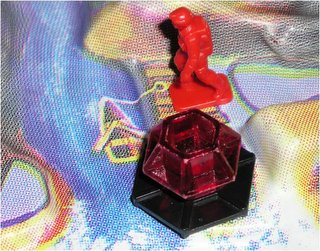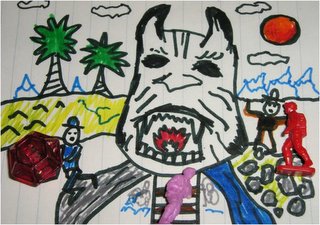
I don't like board games. It's not that I have anything against them personally, and it's not that I don't understand their appeal. My dislike of board games stems from growing up with Summerisle. You see, Summerisle doesn't just like board games, he LIVES them! That's right, when Summerisle partakes in a board game, his normally mellow demeanor transforms into that of the Exorcist. Summerisle must win at all costs and when it appears that he's losing, he becomes something from Middle Earth. To this day when someone says, "Hey, why don't we play such and such", my heart drops into my chest and my genitals disappear like a frightened turtle. This activation of my sympathetic nervous system stems from years of the evil Summerisle, who would stop at nothing to win, win, WIN! This conditioning, coupled with my non-competitive nature (e.g., why I have no interest in sports), makes board games as attractive to me as pulling the lid off of Tupperware in your fridge and discovering a fluffy white puff of mold. As I was surfing the net I discovered this little gem about Fireball Island. Summerisle has always raved about this game but I've never actually seen it. Reading the description makes me want to play it. My genitals just disappeared.
From X-entertainment, "Some board games are so incomprehensibly good that we the public have no choice but to abandon them out of sheer confusion over how to handle anything that awesome. The version of Trouble with two Pop-O-Matic bubbles was one, but even more so, there's Milton Bradley's Fireball Island, a 2-4 player adventure currently being enjoyed up in heaven more than every video game, pinball machine and only-in-heaven-could-you-make-that-shot billiards table combined. It is majesty molded in plastic, and it comes with a Tiki God.

When I first received Fireball Island on some long ago me-day, I wasn't sure what to think. Board game birthday gifts are historically for the pile of shit to make fun of later with people who know you better than loopy Aunt Trudy. I knew of the game, I saw the ads, yadda yadda, but still, it wasn't really a toy, and it definitely wasn't going to fit inside the Nintendo. For a while, it remained sealed up inside my closet, rarely thought of but happily complete. Eventually it became the playground for my action figures, figures whose war tones made them welcome a plastic jungle way more than a completely non-warlike carpet. Fireball Island existed as such for months, hosting battles for everyone from Lion-O to that one dude from C.O.P.S. who I could never name, but had an exposed brain popping out of his head, and thus was a prominent fixture of my hand. I should've written this article tomorrow.
Finally, finally, I actually played the game. It wasn't the one in my closet, nor was the experience even at my house. At a friend's, over iced tea and cold sausage rolls, three young chums busted out the marbles and plastic idol for the kind of good times worth talking about over a decade later. How could I let so many months pass without playing this thing the "real" way? Once you lose your fear of the enormous rule book and digest its many pages, Fireball Island was like the (game of) Life if Life was dipped into a barrel of testosterone and used to wipe Indiana Jones' shitty ass. Between the fireballs and the jungle themes and the jewels and the tiny little safari hats on all of the tiny little player pieces, this was boy heaven in a box.

Your goal only became important if you let it. Fireball Island was more about losing yourself in the insanely detailed 3-D game "board," riddled with trails, rivers and peaks, covered with danger and smeared with marbles that, under this instance and this instance alone, seemed like so much fucking more than just marbles. It was the kind of game that could be over in ten minutes or last hours, depending on how bastardy the players were or how many times they sidebarred for freeze tag. Playing into every child's possible secret fetish, Fireball Island provided opportunities for strategic success, dumb luck, yanked emotions and knocking your opponents' little explorer figurines clear off the god damned kitchen table.
Though not an immensely popular textbook classic, Fireball Island can rest knowing that everyone who had it, loved it. Everyone. I cannot pinpoint what we should attribute this to. It's fun, but for the level of insane flashbacked happy memories I've heard from people here and there through the years, there's no way to explain how the game did what it did and does what it does. It's an intangible. Actually, no it's not. It's the plastic, fireball-spitting idol. But there's other points too -- more poignant ones -- and those are intangibles.

By tiny little kid standards, the board is absolutely huge. By my standards, it's still almost big enough to hide under when someone approaches with ill intent. With all kinds of wacky hills, wobbly bridges and wetty rivers, it takes several rounds to fully explore the jungle. Though many of the obstacles and shortcuts are built right into the board, Dr. Milton Bradley saw fit to include at least a couple of things-in-a-baggie to make the whole ordeal feel all the more incredible. Fireball Island was bursting with just enough bullshit to feel as gloriously involved as Mouse Trap, but wasn't so boggled down with snap-together plastic and tie-this-there shit that it fell apart the second you played. Like Mouse Trap. It was a perfect balance, and the fact that it led to visions of people being incinerated by Kraken testicle-sized fireballs was just the gold gravy.
Basically, the players' objective was to run all the way up to a plastic jewel, seize it, and then run to a little graphic of a boat at the far west of the board. Various traps and torture devices made this almost impossible at times, but with any luck and kids' associations between losing a game of Fireball Island and not wanting to be alive anymore, most contenders stuck with it until the end. This wasn't like Monopoly -- never did anyone broach the subject of calling a "tie" midway through. Noooo way. Not in this game.

Four brazen explorers were the playing pieces, and according to law, whomever owned the particular game had the God given right to pick the red one. The lavender fellow was usually reserved for some asshole's tagalong cousin who nobody wanted there. Though acceptable in two player format, Fireball Island had a charm that could only be fully realized with a complete four player effect.
My magic psychic abilities serving as informant, it's clear that most rounds of Fireball Island were played that way -- with four players. Oh, how wonderful those games were. You'd have people coming at you with jerkheaded card functions from all sides, and in turn, you could be an equivalently large dickhead right back at them. In theory, the game could go on forever and ever, but it usually didn't, because the four players always seemed to abide by the tried and true rule of all four-player-played games: you have two vying for first at the top, a fleeting dark horse in third, and a completely inconsequential moron in dead last. In Fireball Island, the moron was usually the lavender guy.

The game wouldn't have been as interesting if it was just a matter of "rolling around" until someone reached all the necessary targets. No, in Fireball Island, you're only as good as the cards in your hand. You start with one and go through 'em like water, but landing on many certain spots on the board will let you refill your paper weapons -- you're allowed to hold four at once. Some cards let you move ahead spaces, others let you shoot your opponents back a few. With the right combination in your hand, you can literally take three or four turns in a row while everyone else sits around looking disenfranchised. It's a double-edged thing, though -- just when you think you're on the clear road to victory, another explorer can easily bust out a card that'll muck up your entire journey. Then you'll hate cards forever, even regular cards with one-eyed jacks.

Certain spots on the board are much safer than others, and while it's always a matter of joy to cross the two small bridges, it's also one of the most dangerous areas of Fireball Island. Those red marbles are fireballs, of course, and with a well placed shot, any opponent capable of firing one (either by having the right card or by simply rolling a "1") can knock you into the river, or worse, knock you into the river and take away your fairly-and-squarely stolen jewel. To avoid such atrocities, there are six secret caves littered throughout the board, which on top of protecting you from fireballs and greasy opponent paws also serve as warp zones. No, really! From one of the caves stationed just at the start of the journey, you could conceivably hop three turns away from victory. Facts like these explain why so many people sweat balls while playing Fireball Island. The warp zones/caves/secret passages can either be your best friends or arch-enemies during the game, so it's better to maintain a neutral position regarding whether you love them or want to see them dead. Never say "yay, a cave," because you never know when said cave is gonna be your fairy godalcove or the piece of slimy shit that sends you all the way back to the beginning. Be wary, and play smart.
A fun game regardless, the reason Fireball Island still maintains its cult favorite status is, inarguably, the plastic, fireball-spitting idol resting in the center of the board. It's the stuff of dreams and nightmares, and that combined with a thousand other reasons justify providing it the largest picture in this entire giant article. Meet...the idol!

In the center of it all was "Vul-Kar," a rude jungle idol that held one flip-shooting fireball marble that could go in any number of coming-your-way directions. Getting hit with one of the "normal" fireballs sucked, but even those with the most competitive spirit had to admit...getting knocked over by one of Vul-Kar's flaming loogies was almost cool. And if we're talking about knocking over someone else's explorer using Vul-Kar...hell, that's like Christmas and ice cream mixed together, liquefied, thrown into a gel capsule and shoved in our eyeballs. Nothing beat it, and nothing ever will.
Despite his regality, Vul-Kar really wasn't any more important to the game than any of the regular fireball posts. In some ways, his existence was purely for decoration, and so Milton Bradley could find justification in formulating an ad campaign around a big flaming Tiki God with fire in his mouth. He also had a habit of transcending the board game and becoming part of every boy's "action figure crowd." Vul-Kar was defined just enough to work it with the Joes and Decepticons, and what he lacked in stature was more than made up for by the fact that all of your other toys were afraid of his voodoo genetics.
Vul-Kar's other strong point was his location. Being stationed dead center on the board, the idol was also the keeper of the crappy plastic jewel. If you're playing Fireball Island, you want that jewel. It's not too hard to catch, but once you do, you've gotta head back out onto the open trail and cross your fingers that none of the other players have that one little card that could do you in...

NOT THE BATH, BIG BOY NOT THE BATH.
Yes, the bath. The bath of fire. The fireball bath. Whether by rolling a "1" or by yanking out the card shown above, opposing players can climb down your throat and fork-prick your heart until you bleed all over a Milton Bradley board game. Example:

You've found your groove. You're on the way to victory. With the right rolls, you'll be pushing a plastic bingo piece Milton Bradley considers a "jewel" in no time. There's just one problem -- you've entered the direct path of a FIREBALL, and one of those other exploring louses just happens to have a fireball card. With a flick of the opposing player's filthy finger, the marble escapes its post and rolls your motherfucker right into the ground. Unless you're doing this to somebody else, it's not pretty.

After being knocked around by the fiery marble, you've gotta lay your playing piece down in one of several pit areas, where no turns are had and no good comes of anything. The only plus -- and this is a mild one -- is that you can't be nailed in the face with any more fireballs till you wait out a round and escape the Pit of Boredom. And for the record, the instructions actually do state that you're supposed to lay your playing piece down in the pit. No standing. It's really just for added effect, but man, Milton Bradley's keeping some seriously spiteful doofs in their underground game-making dungeon lair.

Course, when you're the one dishing out the fireballs, there ain't nothing better in the world. Though it only happens rarely, you may even be blessed by what my friends and I used to call the "Ultimate Fireball," a not-so-clever name for whenever you manage to knock all of the opposing players down with a single red hot launch. Everyone will hate you for it, but deep down, it's really admiration. Ultimate Fireballs take careful planning, top drawer strategies and golden ticket-level luck to pull off. Nobody likes sharing a third of this terrible humiliation, but it's hard not to respect the starchild who makes it happen.

Finally, a player reaches the end, and Fireball Island renders itself dormant until another day. To win, you've gotta snatch the jewel near Vul-Kar and transport it on this insanely twisted path that forces you to go in all kinds of not-correct directions, riddled with risks of fireballs and other pitfalls of doom. If you survive that, you'll have to make an exact die roll to land at the boating dock, represented as a screenprinted boat roughly the size of the explorer's ass, a fact even more incredible when you remember that the explorers themselves are negative inches tall.
Just an absolutely awesome game. It's not that the gimmicks involved here were so unique, but pretty much every other game that went down similar avenues either overdid this or didn't have enough that. Fireball Island was the perfect mix of gaudy aesthetics and a truly competitive activity. Other games might've looked as good, but most of them were pretty sucky to play -- and games that were arguably more fun to play probably didn't have kickass Tiki God statues that spit fireballs incorporated into them. Fireball Island opened our imagination, our creativity, our private dreams of throwing fireballs at our friends and stealing their jewels. In tribute to you, Fireball Island, I've drawn this picture:

I don't know what I'm trying to say with it, but I like how the jewel-holding blue explorer looks rushed. He should look rushed."



5 comments:
Jeez, I've never heard of this game, either. I like board games okay, although I don't think I ever actually "finished" a game of Monopoly.
"I don't think I ever actually "finished" a game of Monopoly" Probably because Summerisle owned Boardwalk!
Fireball Island is indeed a lost classic. Lauren thinks it's stupid and will never play it with me but when you have 3-4 players with nasty attitudes it can be more fun than life itself! It's true, nothing quite beats the feeling of nailing someone with a fireball. The box is enormous by the way, there is simply no place to put it in our tiny appartment without it boldly sticking out.
Even I can't stand Monopoly and I like most games. Now that I think about it, I don't know anyone who likes that game and yet it's a household name... I suspect the Man has something to do with that.
"The lavender fellow was usually reserved for some asshole's tagalong cousin who nobody wanted there."
My favorite line!
Post a Comment